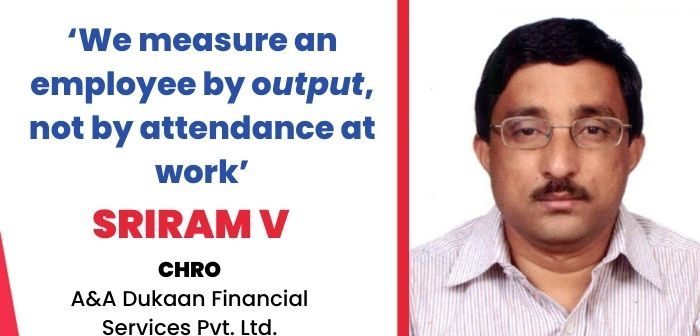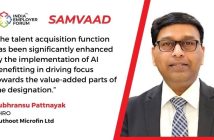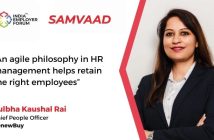Sriram V, CHRO, A&A Dukaan Financial Services Pvt. Ltd., talks to India Employer Forum about the employment trends, employee engagement, attrition and talent pipeline in the current world of work.
Q1. Tell us a little about yourself.
I’m Sriram V and I am the CHRO of A&A Dukaan Financial Services, more famously known as BankBazaar. I have spent about 30 years in the human resource function and all in the IT industry vertical. Despite my 3 decade experience, I still feel like a fresher, and I have to learn every day. So each year, I reset myself to zero to perform better.
Q2. The BFSI sector has been at the forefront of digital transformation initiatives. How is this impacting HR decisions related to hiring, job fit, employee engagement, attrition, etc. in order to increase operating effectiveness?
Everything is BFSI at some point of time in the commercial world in which we live today. In everything there is a payment at some point of time even if you’re in an NGO or you run a political party. Today, BFSI is all pervasive, not in that traditional understanding of ours many years back, where you had to go to the bank and stand before the employee for each query. Also, if there was a strike the whole country would come to a stand still. Across the world and more so in India, the BFSI definitions have changed. Today, if you ask what Google is, you think Google is a pure search engine or a technology player. There are focuses on Google pay which is almost like a payment process and if you go to any of the premium IITs, or the so called top-notch engineering institutions of this country, day zero is occupied by not the core engineering companies, but by Goldman Sachs, including this year’s campus hiring day, followed by the other large multinational banks.
Q 3) What is your take on the future trends of employment in the Tech and Fintech sectors?
Just before this ongoing aggression in Europe, it will be interesting to note many Indian companies were outsourcing work. What started with only a few, now has many companies attempting it. What’s going to happen assuming that things will become normal, that the tech work will become global. Today, you have many players in India, who are employed by Indians, but they don’t have any offices in India and they don’t intend to have an office in India at all. I can talk about many such companies. This whole hiring is going to be not only inside out but outside in. When I say Indian companies are going to look for talent outside India and the same way global companies are not going to hire Indians. Pre COVID, if a company wanted to set up a company here, they would have to come here and set up a shop to complete the registration process. Today, we have moved the talent market further and the talent mobility has a brighter future.
Q 4) What are some innovative measures taken to improve employee engagement and morale during hybrid/online working models?
This is a question in front of many institutions today. Few of them have taken a directional call, few of them are still ambiguous about what it is. At BankBazar, we have told the employee we are open, but the choice is theirs. They decide if they want to come or if they want to work from home. We measure an employee by output, not by his attendance at work. For us, that flexibility should be given to the employee. We have to understand we have our tech centers in Bangalore and many of them have vacated their houses and gone to their native places. So, if we make them come again, and let’s say there is one more wave, there’s uncertainty and they have to go back. Our productivity is very good and people are very happy, so why disturb them? So the choice is theirs, but the only condition is to keep their colleagues informed. They don’t need to inform HR or 100 people at work, only their colleagues have to know whether they’re working from home or in the office since there are dependencies in the tech world.
Q 5) What are the ways in which the industry and educational institutions can collaborate to create a sustained pipeline of talent?
When you speak of educational institutions, there’s a very interesting visibility. If you look at hospitals, if someone wants to go for an emergency treatment, 99% of the population will go to a private hospital, if you have to pick an airline, most will prefer a private one. That’s true for anything you take when it comes to availing a service, but interestingly when it comes to education, even after so many years of experience, if you want to hire the top-notch engineers you end up in IITs and NITs, the government institutions. If you want a higher management grant, you end up going to the IIMs which are again government institutions. We should understand why it is happening. Why IITs and the NITs are still retaining the premium hiring spot. It’s not because of any other reason, but purely because of the meritorious students being there.
Q 6) What inclusions would you like to see in the 4 labor codes currently being worked on by the Government?
I have always been a great believer of experimentation and these four labor codes are a wise decision. The wages, industrial relations, social security and safety is an experiment and I think about a bit of reality to the changes. I won’t say they have changed drastically but I think you can’t keep the ancient acts and keep after that; as they say there are so many definitions of wages, we don’t know what to follow. So, I don’t think the industry is the same as it was fifty years back. These changes are welcome now. Again, labor is a very touchy topic and is very democratic politically, electorally driven. So it’s not going to be easy for all the parties to accept. So, there will be challenges, but in my view we should experiment. We should make changes, if something fails, we can always go back. I don’t think the intention of any of those acts are to make the employee suffer or the employer suffer, it is only to make the process a lot more simpler, make the lives of more people who are running the institutions simpler and also give space to the employees and the labor to understand.
Watch the full interview: In Conversation with Sriram V, CHRO, A&A Dukaan Financial Services Pvt. Ltd.
About Sriram V
Sriram V has been working with Indian, Multinational, and Captive IT Organizations for the last 20+ years, driving the strategic People agenda for the business to facilitate achievement of Business Outcomes. His core strengths are in the areas of HR, Leadership and Organizational change. Recent focus areas are working with Business and its Leaders to drive Organizational Change, Leadership Transitions and succession. Sriram is well experienced in Large Org wide transformational Projects and has helped organizations achieve external recognitions for people practices. He is well networked with the HR community. He has also served as President of the Chennai chapter of CII – HR committee and is an active member in various Industry associations.




